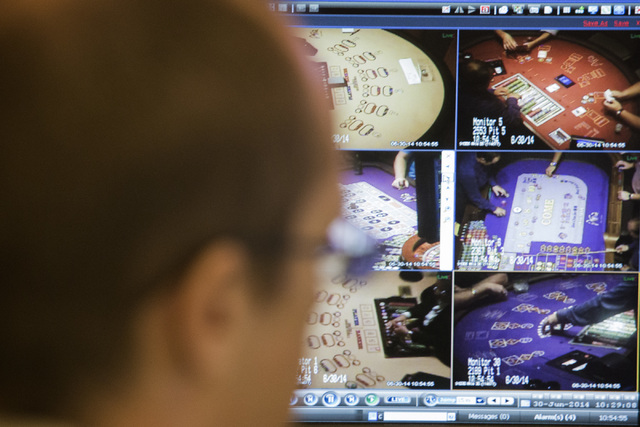Las Vegas hotel casinos surveillance rooms understaffed

Las Vegas NV Dec 4 2017 Las Vegas might be the most surveilled city on Earth — but chances are no one is actually watching you on the other end of the video camera.
Though the city’s casinos are wired with hundreds or thousands of cameras, there are probably at best five people working a shift in the surveillance room of a large-scale property.
The goal of the casino’s surveillance room is to monitor gaming activity and detect potential fraud.
Breaks for food or restroom runs and incoming calls from supervisors or colleagues on the floor mean there are even fewer eyes on all those monitors.
Las Vegas casinos might be heavily regulated when it comes to gaming, but there are few hard numbers they must meet in terms of surveillance.
The Gaming Control Board demands that surveillance rooms be manned by people familiar with the equipment and gaming rules but does not require that more than one person be present.
The surveillance room can be unmanned for up to an hour during each eight-hour shift to allow for breaks, according to Gaming Control Board regulations.
Karl Bennison, chief of enforcement at the Control Board, said his staff members have never come across an unmanned room at a large casino during their inspections.
When it comes to surveillance staff, Las Vegas tends to be thin compared with other jurisdictions, some say.
In Las Vegas, “surveillance runs very lean, often having only two to three people on a shift,’’ said Willy Allison, a Las Vegas-based casino surveillance specialist.
“Considering the volume of people and money in Vegas casinos, their staffing levels are surprising to me and way below worldwide standards.”
Surveillance rooms around the world generally have one person per 25 table games, according to Allison. Las Vegas casinos should have higher standards because of all the amenities they offer in addition to gaming and their large foot traffic, Allison said.
Casino surveillance rooms in Nevada are still permitted to use analog tapes inserted into VCRs to monitor the gaming floor.
The Gaming Control Board requires video resolution be good enough to clearly identify dealers and patrons as well as the value of cards and chips.
Doug Florence, a former surveillance and security executive at several Las Vegas casinos, said some Strip properties still use VCRs to record video. The cassettes have to be held for seven days before they can be written over.
The Gaming Control Board recently required casinos to install surveillance cameras around club premises after several fights over the years led to lawsuits. Those cameras must be digital.
Las Vegas Review Jounral



